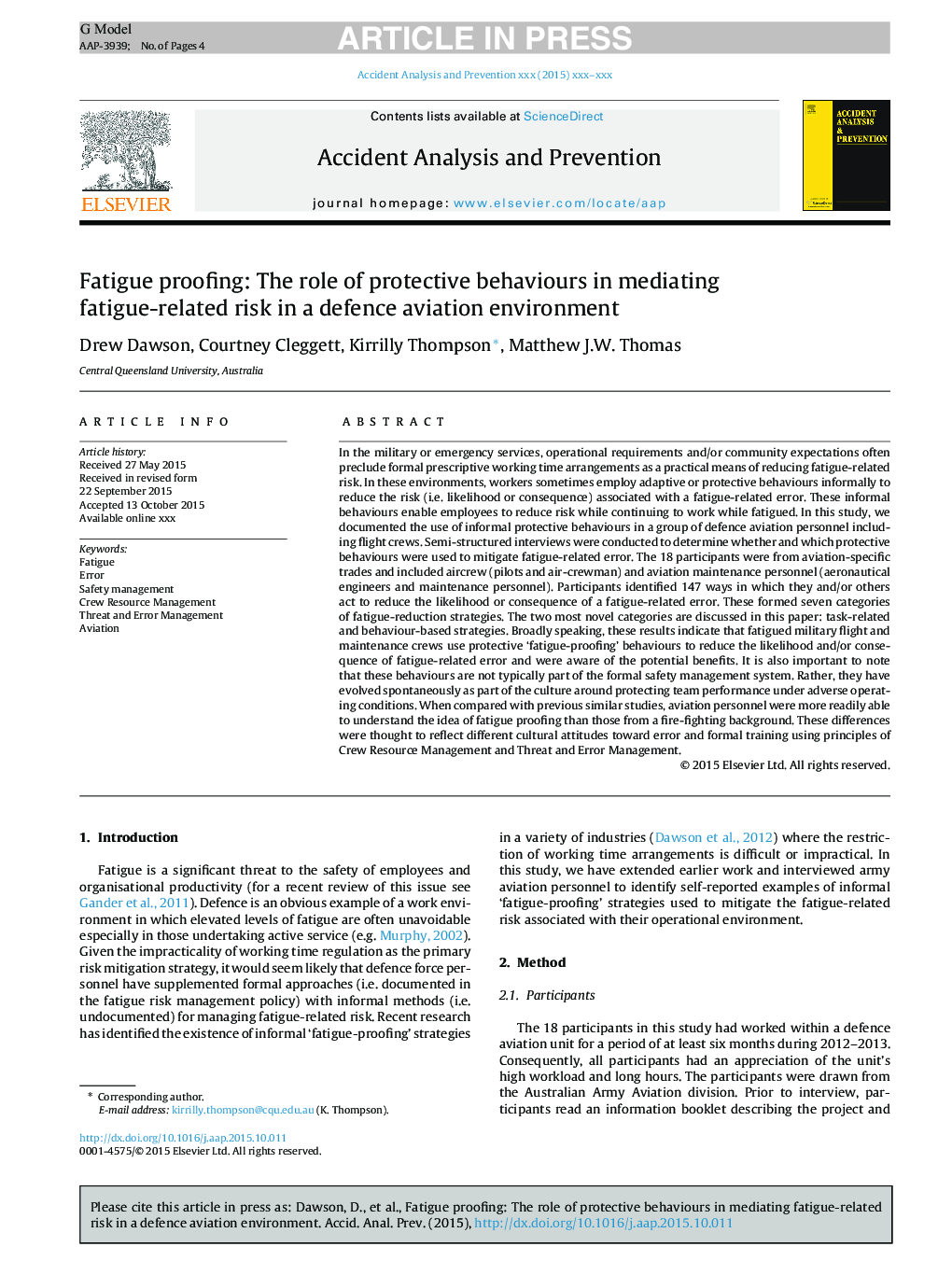| کد مقاله | کد نشریه | سال انتشار | مقاله انگلیسی | نسخه تمام متن |
|---|---|---|---|---|
| 4978776 | 1367780 | 2017 | 4 صفحه PDF | دانلود رایگان |
عنوان انگلیسی مقاله ISI
Fatigue proofing: The role of protective behaviours in mediating fatigue-related risk in a defence aviation environment
ترجمه فارسی عنوان
اثبات خستگی: نقش رفتارهای محافظتی در میانجیگری خطرات مرتبط با خستگی در یک محیط حمل و نقل هوایی
دانلود مقاله + سفارش ترجمه
دانلود مقاله ISI انگلیسی
رایگان برای ایرانیان
کلمات کلیدی
خستگی، خطا مدیریت ایمنی، مدیریت منابع انسانی، تهدید و مدیریت خطا، هواپیمایی،
ترجمه چکیده
در خدمات نظامی یا اورژانس، الزامات عملیاتی و یا انتظارات جامعه اغلب مانع رسم زمان بندی رسمی پیش بینی شده در زمان واقعی می شود به عنوان یک ابزار عملی برای کاهش خطر ابتلا به خستگی. در این محیط ها، کارکنان گاهی اوقات رفتارهای سازگاری یا محافظتی را غیر رسمی می کنند تا خطر (به عنوان مثال احتمال یا پیامد) را با خطای مربوط به خستگی مرتبط سازند. این رفتارهای غیر رسمی کارکنان را قادر می سازد تا در هنگام خستگی، در حالی که کار خود را ادامه می دهند، خطر را کاهش دهند. در این مطالعه، استفاده از رفتارهای محافظتی غیر رسمی در یک گروه از پرسنل هواپیمایی دفاعی از جمله خدمه پرواز ثبت شده است. مصاحبه نیمه ساختار یافته برای تعیین اینکه آیا رفتارهای محافظتی برای کاهش خطاهای مرتبط با خستگی استفاده شده است انجام شد. 18 شرکت کننده از فعالیت های مربوط به حمل و نقل هوایی برخوردار بودند و شامل هواپیما (خلبانان و هواپیما) و پرسنل تعمیر و نگهداری هواپیما (مهندسان هواپیما و پرسنل تعمیر و نگهداری) بودند. شرکت کنندگان 147 راه را مشخص کردند که در آن آنها و / یا دیگران برای کاهش احتمال یا نتیجه یک خطای مربوط به خستگی اقدام می کنند. این هفت دسته از استراتژی های کاهش خستگی را تشکیل می دهند. در این مقاله دو دسته رمان های جدید در این مقاله مورد بحث قرار می گیرند: استراتژی های مرتبط با کار و رفتار. به طور کلی، این نتایج نشان می دهد که خدمه خدمت نظامی و خدمه تعمیرات از رفتارهای مقاوم در برابر خستگی محافظت می کند تا احتمال و پیامد خطا مربوط به خستگی را کاهش دهد و از مزایای بالقوه آگاه بود. همچنین توجه داشته باشید که این رفتارها معمولا بخشی از سیستم مدیریت ایمنی رسمی نیستند. بلکه آنها خود به خودی به عنوان بخشی از فرهنگ در اطراف محافظت از عملکرد تیم در شرایط عملیاتی نامطلوب تکامل یافته است. در مقایسه با مطالعات مشابه مشابه مشابه، پرسنل هواپیمائی قادر بودند تا ایده اثبات خستگی را درک کنند. به نظر می رسد که این تفاوت ها، نگرش های فرهنگی مختلف به خطا و آموزش رسمی با استفاده از اصول مدیریت منابع انسانی و مدیریت تهدید و خطا را منعکس می کند.
موضوعات مرتبط
مهندسی و علوم پایه
مهندسی شیمی
بهداشت و امنیت شیمی
چکیده انگلیسی
In the military or emergency services, operational requirements and/or community expectations often preclude formal prescriptive working time arrangements as a practical means of reducing fatigue-related risk. In these environments, workers sometimes employ adaptive or protective behaviours informally to reduce the risk (i.e. likelihood or consequence) associated with a fatigue-related error. These informal behaviours enable employees to reduce risk while continuing to work while fatigued. In this study, we documented the use of informal protective behaviours in a group of defence aviation personnel including flight crews. Semi-structured interviews were conducted to determine whether and which protective behaviours were used to mitigate fatigue-related error. The 18 participants were from aviation-specific trades and included aircrew (pilots and air-crewman) and aviation maintenance personnel (aeronautical engineers and maintenance personnel). Participants identified 147 ways in which they and/or others act to reduce the likelihood or consequence of a fatigue-related error. These formed seven categories of fatigue-reduction strategies. The two most novel categories are discussed in this paper: task-related and behaviour-based strategies. Broadly speaking, these results indicate that fatigued military flight and maintenance crews use protective 'fatigue-proofing' behaviours to reduce the likelihood and/or consequence of fatigue-related error and were aware of the potential benefits. It is also important to note that these behaviours are not typically part of the formal safety management system. Rather, they have evolved spontaneously as part of the culture around protecting team performance under adverse operating conditions. When compared with previous similar studies, aviation personnel were more readily able to understand the idea of fatigue proofing than those from a fire-fighting background. These differences were thought to reflect different cultural attitudes toward error and formal training using principles of Crew Resource Management and Threat and Error Management.
ناشر
Database: Elsevier - ScienceDirect (ساینس دایرکت)
Journal: Accident Analysis & Prevention - Volume 99, Part B, February 2017, Pages 465-468
Journal: Accident Analysis & Prevention - Volume 99, Part B, February 2017, Pages 465-468
نویسندگان
Drew Dawson, Courtney Cleggett, Kirrilly Thompson, Matthew J.W. Thomas,
